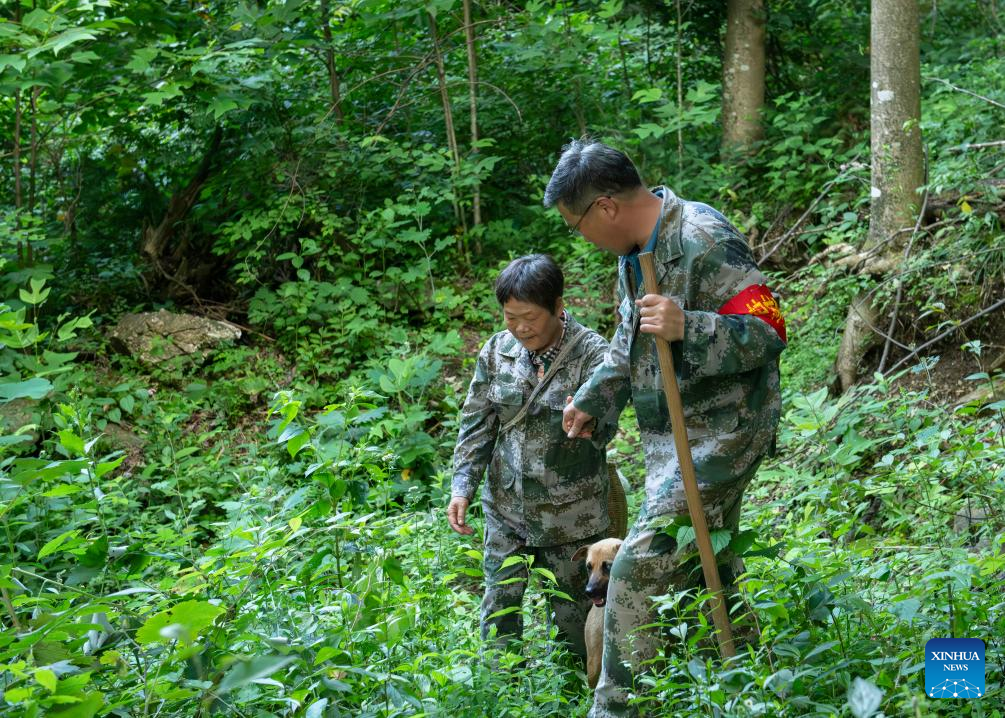Forest ranger couple witness ecological improvements in east China

Hong Xiaochun (front) helps his wife Huang Shuping climb a steep slope during their patrol in the forest in Shexian County of Huangshan City, east China's Anhui Province, June 15, 2024. (Xinhua/Fu Tian)
At the break of dawn, as the first light stirs the mountain birds and campers from their slumber, Hong Xiaochun and Huang Shuping, a forest ranger couple both aged 55, prepare to venture deep into the woods in east China's Anhui Province.
With baskets brimming with food and water, they follow the patrol route on their smartphone applications. Nestled in a valley of Shexian County in Anhui, the two-story forest patrol station, aptly named "Washang," is enveloped by a lush expanse of over 7,000 mu (about 4.67 square km). Since 1991, Hong and Huang have been the dedicated stewards of this verdant domain.
"The forest has been transformed from an obscure spot on the map to a renowned destination for sightseeing and environmental conservation," Hong said, gesturing towards the thriving woodland. "We feel fortunate to have witnessed these positive changes," he added, noting the evolution of their roles and development philosophy towards nature.
Their journey with the forest began on a summer afternoon 33 years ago. In the summer of 1991, the newlywed couple volunteered at the "Washang" station, one of the most impoverished outposts in Shexian County. The station's name, which translates to "higher than the rooftops" in Chinese, reflects its remote and elevated location. Back then, the station was a solitary outpost, miles removed from the nearest village, devoid of electricity and any semblance of telecommunication.
"We used to work at separate stations, but here, we could be together," Huang recalled. "We wanted to give it a try, to carry on the legacy of our parents who once protected the forest at their own posts," she said, acknowledging the hermit-like existence as both taxing and fulfilling.
During the 1990s, the forest under the Washang station's purview was a vital timber reserve, making it a target for illegal loggers. The couple was tasked with safeguarding over 7,000 mu of forest from pests, fires and illicit deforestation. They also committed themselves to afforestation, turning the desolate area into flourishing groves.
"Each day, we'd spend over eight hours trekking nearly 20 km through the woods at that time. Sometimes, we had to forge paths to unexplored areas," Hong recounted, mentioning that a fresh pair of boots would be completely worn out after a month of forest patrolling.
Their efforts have yielded rich rewards. Over the past three decades, there has not been a single forest fire or case of wildlife resource destruction. Thanks to their unwavering commitment, the forest canopy has grown denser.
As the years have passed, Washang station has undergone a renaissance, bringing new life to the mountains and the couple's endeavors.
In 2017, Anhui launched a forest chief reform initiative, promoting ecological restoration and the prudent exploitation of forest resources. In 2023, the province had completed afforestation of some 281,500 mu and the "under-forest" economy spanning over 12.6 million mu. The "under-forest" economy refers to the development of understory planting, breeding, gathering and forest tourism industries, which rely on forest land resources and the ecological environment of forests.
Today, as Hong and Huang ready themselves for patrol, they always carry a hoe to tend to the newly planted economic crops among the trees, including 600 mu of hickory and 120 mu of Torreya grandis.
"The under-forest economy enriches the environment and yields economic benefits without harming the forest's existing trees," Hong explained, adding that hickory alone can generate a profit of 80,000 yuan (about 11,000 U.S. dollars) annually.
With advancements in infrastructure and information technology, the once isolated patrol station now enjoys internet connectivity. This has helped attract an increasing number of tourists from across the country, many of whom opt to camp in the courtyard in front of their station.
"Social media has helped connect us with the world beyond the mountains and bring the outside world to us," Huang said, as she moved through the vibrant campsites, educating visitors on fire safety.
From an obscure forest to a paragon of environmental stewardship and a burgeoning tourist attraction, the mountains' dramatic transformation is a testament to the couple's relentless dedication over the past 30 years.
"It's akin to watching our children grow, marking it the most rewarding chapter of our lives," said the couple.
